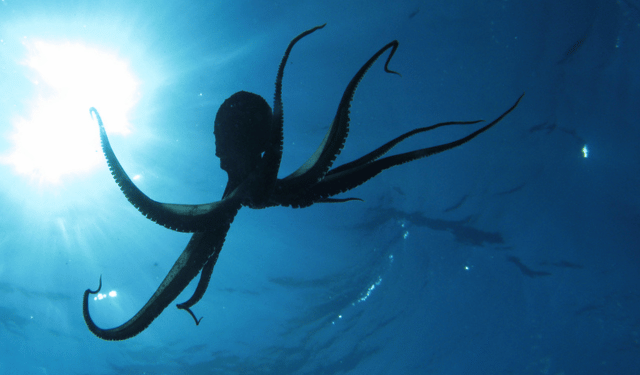Octopus crucial in controlling invasive species in the Mediterranean – A recent study conducted by the Institute of Marine Sciences (ICM-CSIC) has revealed previously unpublished details about the diet of the juvenile common octopus (Octopus vulgaris), shedding new light on its ecological role in the Mediterranean. This research, developed as part of the OCTOSET and ECOPHYN State Plan projects, has identified for the first time the dietary needs of octopuses in the early stages of their life on the seabed, a fundamental knowledge for the sustainable management of one of the most valued and exploited fish species.
Analysing the diet of young octopus
Young octopuses newly settled on the seabed feed mainly on amphipods, a group of small crustaceans that includes the invasive species Jassa slatteryi. This aspect, highlighted by the study, suggests that octopuses may play a significant role in the regulation of this alien species, now widespread in the Mediterranean. The results show that 90% of the stomachs analysed contained remains of Jassa slatteryi, indicating a feeding preference that could have a positive impact on the local ecosystem by limiting the proliferation of this invasive species.
Molecular technologies for greater precision
The research used advanced molecular techniques to accurately identify the prey consumed by young octopuses, overcoming the limitations of traditional techniques based on morphological analysis. These technologies made it possible to detect that, apart from amphipods, hydrozoans constitute the second most frequent group in the diet of these cephalopods. This level of detail would not have been possible with conventional methods, which would not have been able to identify remains of prey composed mainly of water, such as hydrozoans.
Implications for the sustainable management of octopus populations
The study used an innovative juvenile octopus collector, patented as a utility model, to capture the specimens required for analysis. This tool has already attracted the interest of international research groups, paving the way for future collaborations and the possible replication of the experiments in different marine contexts.
The sampling, which lasted three years in the Vilanova i la Geltrú fishing area (Barcelona), enabled valuable data to be acquired on how octopus populations settle and recruit, providing crucial information for a more effective and sustainable management of the species.
Future perspectives: microbiome and marine conservation
The researchers intend to continue their investigations into the trophic ecology of the common octopus, focusing in particular on how variations in diet may influence the composition of the microbiome in the cephalopod’s digestive tract. This aspect, as yet little explored, could offer new insights not only into the health and well-being of the octopus, but also into its biotechnological potential in the production of enzymes and bioactive compounds.
Furthermore, understanding the octopus microbiome could prove crucial for the conservation of marine ecosystems, providing early clues to ecological imbalances and microbial diversity, as well as helping to assess the impact of climate change on marine habitats.
The diet of the juvenile common octopus, revealed for the first time by this study, is a key building block for better understanding the ecology of the Mediterranean and for developing sustainable management strategies. The new techniques and innovative tools used in the research pave the way for future discoveries and international collaborations, with important implications for the conservation of marine biodiversity and the sustainability of fishery resources.
The octopus key in controlling invasive species in the Mediterranean








